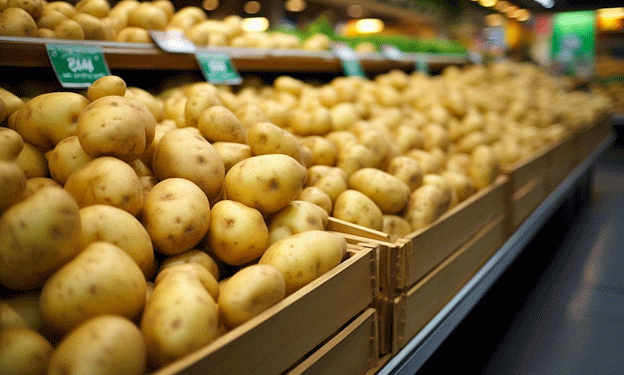Brazilian potato prices have been on a steady decline, driven by favorable harvest conditions. Last week, prices fell notably, particularly in central Minas Gerais, where a devaluation of 14.7% was recorded. This trend is expected to continue as the harvest season progresses, bringing significant implications for farmers and market dynamics.
Price Decline Across Major Markets
In São Paulo (SP), the price of special type Agate potatoes closed at BRL 163.91 per 25 kg sack (USD 30.40), marking an 8.55% decrease from the previous week. In Rio de Janeiro (RJ), prices dropped to BRL 155.71 per sack (USD 28.88), a 5.30% decline. Belo Horizonte (MG) saw the most significant decrease, with prices falling by 14.65% to BRL 147.84 per sack (USD 27.42).
Factors Behind the Price Decline
The primary driver of this price decline is the intensifying harvest season, particularly during the dry period. This year’s harvest has been particularly bountiful in regions such as South Minas, Triângulo Mineiro, and Southwest São Paulo. The dry conditions have allowed for a more efficient harvest, increasing the supply of potatoes in the market and consequently driving prices down.
As the month progresses, the demand for potatoes typically wanes, contributing to the price reduction. This seasonal trend, combined with the abundant supply, has created a buyer’s market, with prices expected to remain low as the harvest continues.
Future Outlook
Looking ahead, the trend of declining prices is anticipated to persist as the harvest season advances. Farmers in Brazil are likely to continue benefiting from the favorable weather conditions, which have mitigated the usual challenges posed by rain. As a result, the market will likely see sustained lower prices in the near term.
For consumers, this represents an opportunity to purchase potatoes at reduced prices. However, for farmers, the challenge lies in managing the financial impact of these lower market prices. Effective strategies, such as diversifying crops and improving storage techniques, could help mitigate some of the economic pressures.
The current decline in potato prices in Brazil, driven by favorable harvest conditions and seasonal demand fluctuations, presents both opportunities and challenges. While consumers benefit from lower prices, farmers must navigate the economic impacts of an oversupplied market. Continuous monitoring of market trends and strategic planning will be crucial for stakeholders to adapt and thrive in this dynamic environment.







